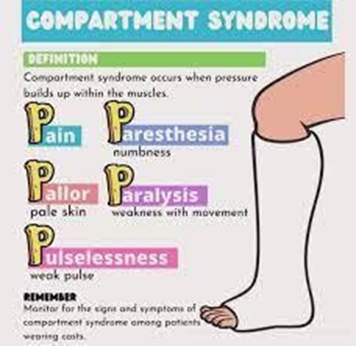In caring for a client with a fracture of the femur, the nurse should be alert for compartment syndrome. What symptom is characteristic of this complication?
Tachycardia and petechiae over the chest wall and buccal membranes.
Positive Homan's sign with calf tenderness and warmth.
acute cough, calm, and decreased blood pressure.
Bulging, Tingling or burning sensation, numbness
The Correct Answer is D
Choice A rationale: Tachycardia and petechiae over the chest wall and buccal membranes are signs of fat embolism syndrome, another complication of fractures that occurs when fat globules enter the bloodstream and obstruct pulmonary vessels.
Choice B rationale: Positive Homan's sign with calf tenderness and warmth are signs of deep vein thrombosis, a condition that can occur after prolonged immobilization or surgery.
Choice C rationale: Acute cough, cyanosis, and decreased blood pressure are signs of pulmonary embolism, a life-threatening condition that occurs when a blood clot travels to the lungs and blocks blood flow.
Choice D rationale: These are signs of compartment syndrome, which is a serious complication of fractures that occurs when increased pressure within a closed space compromises blood flow and tissue perfusion. Compartment syndrome can lead to ischemia, necrosis, and nerve damage if not treated promptly.

Nursing Test Bank
Naxlex Comprehensive Predictor Exams
Related Questions
Correct Answer is {"dropdown-group-1":"A","dropdown-group-2":"D"}
Explanation
Choice A rationale: A three-point gait is used when one leg is weaker or injured and cannot bear weight. The client should place the crutches about 12 inches in front of the feet and lean forward on the crutches. Then, the client should lift the injured leg and
swing the body forward between the crutches, landing on the uninjured leg. The client should not put any weight on the injured ankle, as ordered by the physician.
Choice B rationale: A four-point gait is used when both legs can bear some weight, but one is weaker than the other.
Choice C rationale: A swing-through gait is used when both legs can bear weight, but need assistance with balance and coordination.
Choice D rationale: A two-point gait is used when both legs have equal strength and can bear full weight.
Correct Answer is C
Explanation
Choice A rationale: A client with nausea, vomiting, and abdominal pain may have gastroenteritis, food poisoning, or appendicitis, which are not directly related to the eyes.
Choice B rationale: A client with chest tightness and heartburn may have gastroesophageal reflux disease (GERD), angina, or myocardial infarction (MI), which are also not associated with the eyes.
Choice C rationale: A client with facial drooping and left-sided weakness may have a stroke, which is a medical emergency that requires immediate attention. An eye examination can help detect signs of stroke, such as pupil asymmetry, visual field defects, or eye movement abnormalities. A stroke can cause permanent brain damage or death if not treated promptly.
Choice D rationale: A client with fatigue, fever, and productive cough may have a respiratory infection, such as pneumonia or tuberculosis, which are unlikely to affect the eyes unless there is a systemic complication.
Whether you are a student looking to ace your exams or a practicing nurse seeking to enhance your expertise , our nursing education contents will empower you with the confidence and competence to make a difference in the lives of patients and become a respected leader in the healthcare field.
Visit Naxlex, invest in your future and unlock endless possibilities with our unparalleled nursing education contents today
Report Wrong Answer on the Current Question
Do you disagree with the answer? If yes, what is your expected answer? Explain.
Kindly be descriptive with the issue you are facing.
